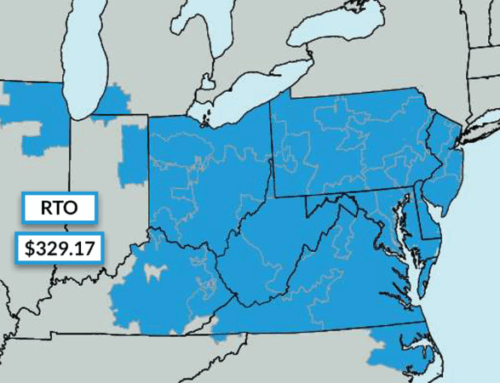You might be aware of energy scams if you live or own a business in a deregulated energy state. Unfortunately, energy fraud occurs regularly in states where consumers can shop for third-party energy suppliers. This article outlines the different types of common energy scams in the marketplace, how to avoid them, and what to do if you think you’ve been scammed.
What Are Energy Scams?
Energy scams happen when something unauthorized happens to your electricity and/or natural gas bill. This could be as simple as an energy supplier or energy broker getting a hold of your utility account number and enrolling you in an energy plan with a supplier in a deregulated state. Either way, it is important to recognize the signs of energy fraud so that you can protect your accounts and yourself from a potential scam. There are several common types of energy scams and fraud that occur quite often.
Unauthorized Switches
One of the most common types of energy scams in deregulated energy markets is the unauthorized switch. In the energy industry, this is also known as “slamming”. Slamming happens when an energy sales representative uses your utility account information to sign you up with a supplier without your consent. This is often done in an attempt to earn a commission or profit from your electric account with the hopes that you will not notice the change. If your account is slammed then you might receive an account drop notification from your existing energy provider.
Identity Theft Using Energy Fraud
Another scam to be on the lookout for is bad actors pretending to be your utility company. If someone calls you on the phone or knocks on your door telling you that they are with the local utility company, chances are they are lying in an attempt to get personal information from you. This is also known as a “phishing” scam. Be weary about providing these people with your date of birth or social security number without verifying their identity first.
How to Verify If an Energy Rep Is Legitimate
If an energy sales representative walks into your business or knocks on your door, there are several ways to verify that they legitimately represent a licensed energy supplier and are not running a scam. First, be sure to ask them for proper identification, such as a badge with a license number or a business card. Check the handle of their email address to verify that it is associated with a registered domain address of a licensed energy supplier (e.g. [email protected]). Another key tip is to cross-reference your state’s PUC or Board of Utilities to ensure the company they claim to be representing is licensed and bonded.
At the end of the day, never make a fast decision to sign up with an energy supplier on the spot. Nothing is ever an emergency. A legitimate sales representative will always follow up with you after you’ve had time to do your due diligence.
Energy Contract Fraud
Sometimes the fraudster is blatant about their scam and does it right in front of your face. Energy contracts can be confusing to understand, and interpreting the details of the contract sometimes requires a law degree. Some energy scammers will lie to you about the terms of the contract in order to get you to sign. They can lie about the total energy rate, the fixed components of the rate, and even the contract term.
Red Flags to Watch for in Energy Offers
If you’re ready to sign an energy supplier contract, then here are some things to keep an eye on in the terms and conditions. Most state regulators require energy suppliers to have a deal summary sheet as the cover page of the contract. This sheet will highlight the important information of your contract, such as start date, end date, total rate, price components, and supplier license information. If the deal summary sheet is missing, be on high alert.
Furthermore, beware of sales representatives using high-pressure sales tactics, such as “this rate will expire today and I cannot guarantee I will be able to quote it tomorrow”. Yes, energy prices are volatile, but they do not change that drastically from day to day. A legitimate company gives its customers ample time to review contracts before asking them to sign. Be sure that you are granted this leeway.
Another thing to watch out for in an energy contract is the use of language around guaranteed savings. Most state regulators are strict about not allowing suppliers or salespeople to promise any sort of savings guarantee, since the energy markets are so volatile and savings are based on a number of factors. If your sales rep is promising savings, look out!
What Are Letters of Exclusivity and Are They Risky?
Letters of Exclusivity, or LOEs, are documents giving brokers exclusive rights to negotiate energy rates with suppliers on behalf of a particular customer. These letters are used legitimately when a customer’s account was being priced in the past by another broker, and the customer wants to grant a new broker the right to price with the same supplier(s). On the other hand, LOEs can be used in an unscrupulous manner by non-transparent brokers attempting to lock you into bad deals. Some brokers will mislead customers by having them unknowingly sign LOEs in order to block competitors from pricing the customer’s account. They will then attempt to force the customer into signing an energy contract not in their favor.
If a broker is asking you to sign any sort of authorization letter, be sure you read the details, and beware if the language has any mention of exclusivity. If it does, question the broker as to why exclusivity is needed, as many times, brokers can price accounts with a simple non-exclusive authorization. Always read the fine print and never sign anything without legal guidance.
Do Energy Scams Happen Often? Is Energy Fraud Really A Thing?
Unfortunately, energy scams are more prevalent than you think! With many bad actors trying to take advantage of unsuspecting customers, energy fraud occurs on a regular basis. Most fraudsters present themselves as legitimate representatives from utility companies or other energy firms in an attempt to defraud you.
Who Is Most At Risk To Be Scammed?
Anyone is really at risk to fall victim to energy fraud. Since the rules of energy deregulation are so complicated, it is easy to believe a good lie. Statistics tell us that most victims of energy fraud are residential customers since they are the least aware of energy deregulation. Although business owners tend to be savvier with their vendors, they are not exempt from this fraud either. Some of the largest commercial energy consumers in the country have been victims of energy fraud.
Scams Targeting Businesses vs. Residential Customers
| Scam Type | Residential Customers | Business Customers |
| Impersonating Utility Agents | X | |
| Robocalls | X | X |
| Forged Contracts | X | |
| Misrepresented Terms | X | X |
| High Variable Rates | X |
How Energy Fraud Works
Energy fraud and scams take on many shapes and sizes. Here are some of the most common ways scammers attempt to deceive energy consumers.
Telemarketing
Phone scams are the most common form of fraud in the energy industry. Since these scammers can be located anywhere and are safer from prosecution, they tend to be brazen with their tactics. Beware of odd phone calls, robocalls, or people on the phone pretending to be your local utility company or energy supplier.
Door-To-Door Energy Scams
Similar to the unauthorized switch scam described above, door-to-door salesmen will sometimes misrepresent themselves in an effort to look at your electric bill, get your account number, and sign you up without your knowledge. We’re not saying that all door-to-door salesmen are bad, but just be weary about how they represent themselves. They should be upfront with you about what they are selling, the details of the energy rate, and be able to explain the terms of the contract.
Email & Text Messaging
Have you ever received an odd email or text message to your phone? Sometimes these messages can be a form of phishing in an attempt to get you to give up personal information. It is always best to check the sender’s email address or phone number. If you do not recognize it, then ignore it! Be sure not to click on any links in the emails or text messages as sometimes these are attempts by computer hackers to get on your device.
What To Do If You Think You’ve Been Scammed
If you think you fell victim to an energy-related scam, then following these steps can help you to lessen your risk exposure. Some of these tips can also be used to prevent an energy scam from happening to you.
Contact Your Local Utility
The first step is to contact your local utility company. They have all of your energy account information on file and can tell you the details about your utility bill. If you think you were switched to an energy supplier without your consent, the utility company will be able to tell you and even switch your account back for you. The utility can also verify if the person calling or knocking at your door actually works for them.
Freeze Your Credit
If you gave out any personal details to the scammer (DOB or SSN), then it is critical to freeze your credit profiles with each credit bureau. This will prevent the scammer from being able to open up any accounts in your name and can even help you track down the fraud. You can place a freeze on your credit profile by contacting the three major credit reporting agencies: Equifax, Transunion, and Experian.
Sign Up For Identity Theft Monitoring
There are several identity theft prevention tools and services on the market. Programs like LifeLock are great for monitoring the use of your social security number across the internet and with different companies. If you gave out your personal information, then investing in a tool like this could be valuable.
Remove Your Utility Account From Any Public Lists
A great way to prevent any future energy fraud, particularly slamming, is to remove your utility account details from any public lists. Most utility companies publish a list of customer utility account information that is available to suppliers and licensed energy brokers. Unfortunately, some scammers within the energy sector can use this information to sign up your account without your knowledge. Calling your utility company and requesting to be removed from the public customer list is a surefire way to protect your account.
How to Protect Your Information From Scammers
If you are looking for ways to proactively protect your utility information from scammers, here are a few tips:
Don’t Share Your Utility Account Number
Some customers think that their utility account number is not a sensitive piece of data. It is! Be sure to never share your utility information with anyone unless you plan on working with them in the future. Unscrupulous salespeople and suppliers can use your utility account number to slam your energy account and sign you up for an energy plan without your consent.
Remove Your Information From Public Utility Customer Lists
Most public utility companies in deregulated energy states publish an eligible customer list (ECL) that provides customer account information and usage data to licensed energy brokers and suppliers. Scammers can get access to this information and can use it to target your business or sign you up for energy plans without your consent. Be sure to contact your utility company and request to be removed from this list or to be placed on the private list.
Shred Old Utility Bills
Shredding old utility bills is a great habit for avoiding energy scams. Believe it or not, some scammers will go through your trash to find utility statements in order to slam your account unwittingly. These scammers will also go through your mail to open utility bills in order to steal your account information. The most surefire way to protect yourself is to enroll in paperless billing with the utility company so that no paper statements are ever mailed to you.
Review Your Bills In Detail Each Month
A simple way to avoid energy scams is to thoroughly review your bills each month for accuracy. Some simple things you can check are the supplier, the supplier rate, the total kilowatt hours, and the utility delivery charges. If you are not sure how to dissect the anatomy of your electric bill, it might be smart to get a utility bill audit done on an annual basis. This audit can identify errors and places where you might have been overbilled. If successful, a good auditor can get you money back in the form of a refund.
Enroll In Utility Account Notifications
Most utility companies have electronic email notifications that can alert you when material changes happen to your bill. For example, most utilities will notify you when a new supplier takes over your account for electricity or natural gas billing. This is an important piece of information to have in real-time, as you can block suppliers from enrolling you without your permission. In fact, most states allow you 14 days from a new supplier enrollment to dispute the switch with no issues.
Work With A Reputable Energy Broker
Finally, the best way to protect yourself from energy fraud is to have an expert in your corner, always watching and monitoring your energy accounts. Finding a reliable energy broker might not be easy, but when you do, be sure to hold on to them for life. A reputable energy broker will offer more than simple energy contract transactions. They will monitor the energy market for future buying opportunities, oversee your energy accounts to ensure accurate billing, and handle any adverse situations (like an energy scam) if they arise.
Need Help Fighting Back?
Energy fraud is no joke, and when it happens to you, it can cause great stress and even the loss of money. At Diversegy, we help our customers protect their energy accounts from scammers and fraud. If you are the victim of an energy fraud, contact us to discuss the best course of action to prevent future fraud and to lessen your exposure.



